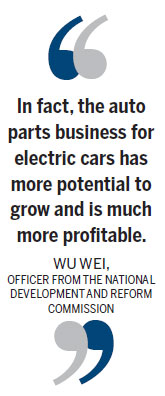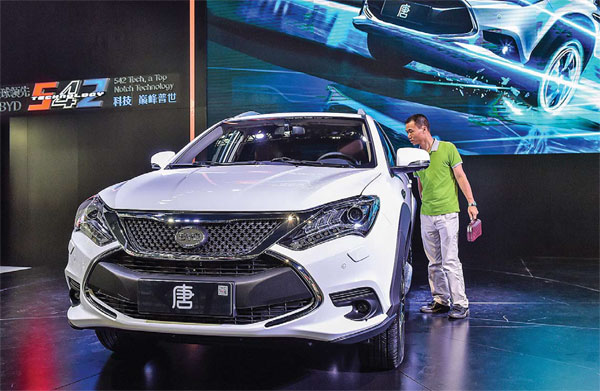Electric cars energizing China
Updated: 2015-07-31 08:30
By Du Xiaoying(China Daily Europe)
|
|||||||||||
New-energy vehicles are starting to take off, with sales reaching almost 73,000 units in the first half of the year, a 240-percent increase
The new-energy vehicle industry is starting to boom in China, thanks to rising public awareness of the importance of environmental protection and the need for sustainable development.
Many companies are squeezing into the market based on their belief that it holds great potential.
|
BYD's first plug-in hybrid SUV is presented at the Shenzhen-Hong Kong-Macao International Auto Show in Shenzhen on June 6. Mao Siqian / Xinhua |
In July, a joint venture between carmaker BAIC BJEV, trading company JDWM Group and new-energy firm Teld was established in Beijing. The partners say it is among the first joint venture companies in the country offering charging services for electric cars.
The joint venture's goal is to build 2,000 public charging posts across the country by the end of 2015 to meet the needs of individuals, taxis and service vehicles.
The company says it will collect only the cost of electricity from customers for charging their vehicles. The company will pay for installation and operation of the public charging posts.
BAIC BJEV is the new-energy vehicle arm of automaker Beijing Automotive Industry Holding Co Ltd, a Chinese state-owned enterprise that owns several automobile and machine manufacturers.
The other two companies in the joint venture are privately owned. Qingdao Teld New Energy Co Ltd is a subsidiary of Qingdao Tgood Electric Co and a new-energy company that aims to build a network for the e-car charging industry in China.
JDWM is an enterprise group whose business range includes vehicle sales, import and export trade, real estate development and logistics.

With a growing number of incentive policies and tightening fuel standards, China's new-energy vehicle market is growing rapidly, and industry insiders say it will soon surpass the United States as the largest in the world.
Dong Yang, secretary-general of the China Association of Automobile Manufacturers, said he thinks China's new-energy vehicle market will become the world's largest this year.
According to the association, the country's new-energy vehicle sales hit 72,711 units in the first half of the year, a 240-percent increase from the same period last year. Sixty-four percent of those were pure electric vehicles.
The industry dubbed 2014 "the first year of the new-energy vehicle era" in China, as the output and sales of NEVs in the country were 78,499 and 74,763 vehicles respectively, which was 3.5 and 3.2 times the corresponding figures in 2013.
Other statistics also reflect this trend. In Beijing, 5,091 new-energy cars received license plates in the first half of this year, and a record 1,955 license plates were issued in June.
According to Beijing authorities, in June, there were 6,454 people competing for 5,697 plates for new-energy cars they hoped to buy. This meant the success rate for receiving a NEV number plate fell for the first time - from 100 percent to 88 percent.
"I really like my new car. It is very convenient to drive in the city, and using it is much cheaper than a normal car," says Yan Ping, a Beijing resident who bought a BYD E6 pure electric car in June. According to Yan, his new car costs him only 60 yuan ($10; 9 euros) to 70 yuan for a full charge that usually takes him 320 kilometers, but sometimes up to 350 km.
Chinese policymakers are attempting to lay the foundations for a transformation in the auto industry, as well transform the country from a global sales leader to a manufacturing powerhouse.
Although the market has boomed, the competitiveness of domestic brands in advanced manufacturing has remained relatively weak, partly due to the fact that China was a latecomer to the party and that its companies did not invest heavily in research and development.
But it is not too late when it comes to new-energy vehicles. China stands at the starting line along with Germany, the United States, Japan and South Korea. With a major push, China could realistically become a manufacturing power in the sector, experts say.
In 2012, the State Council set a goal of having 500,000 new-energy cars on the road by the end of this year, and 5 million by 2020. To achieve this, the government plans to establish a research and development system and industrial chain for e-cars within the next four years.
In May, the State Council also unveiled Made in China 2025, a program aimed at upgrading the country's manufacturing power over the next decade. It includes special funding and tax incentives in 10 industrial sectors, including new-energy vehicles.
Local governments also are implementing preferential policies in response to the central government's appeal to popularize the vehicles across the nation.
In April, Beijing exempted pure electric cars from the city's number plate policy, which restricts cars with certain numbers plates from being on the road between 7 am and 8 pm from Monday to Friday within the capital's Fifth Ring Road.
Many big cities in China have imposed such restrictions on vehicles in recent years to ease traffic and reduce pollution.
Beijing authorities announced that the city would be friendlier to new-energy car owners, allowing them to pay lower or even zero parking fees and highway tolls in the near future.
Beijing also plans to build a charging network for new-energy cars and to install charging posts within a 5-km radius inside the Sixth Ring Road by the end of this year.
There are currently 225 public charging stations and a total of 1,700 public charging posts in the city, as well as nearly 3,000 private charging posts.
Public charging posts will be available in more key areas of the city in the second half of this year, officials say.
Also, last month, the National Development and Reform Commission and the Ministry of Industry and Information Technology issued new regulations for newly established pure electric passenger vehicle enterprises. The regulations lowered the financial entry standard for e-car makers but raised the technology standard.
Yet, despite the seemingly positive outlook for the e-car market, industry insiders say there are risks.
"You cannot really be a player unless you have more than 10 billion yuan. All investments are risky, investing in electric vehicles is no exception, but it is even more risky," says Wu Wei, an officer from the industry coordination department of the NDRC, the country's economic planner.
According to Wu, innovation ability and the level of research and development are key for enterprises producing or wanting to produce electric cars.
Companies should think "very carefully" before making a move and entering the market, Wu says.
"There is no need for investors to only focus on auto manufacturing. In fact, the auto parts business for electric cars has more potential to grow and is much more profitable," he says.
duxiaoying1@chinadaily.com.cn
(China Daily European Weekly 07/31/2015 page23)
Today's Top News
Debris found off Africa linked with Flight MH370
Former military leader Guo Boxiong expelled from CPC
Presidents vow to fight terrorism
China's youth: rebellious, or misunderstood?
Somalia offers apology, seeks China's help
Myanmar grants amnesty to 155 Chinese loggers
Bid blocked at UN to send Malaysian Airlines jet downing to int'l tribunal
Afghanistan says Taliban leader is dead
Hot Topics
Lunar probe , China growth forecasts, Emission rules get tougher, China seen through 'colored lens', International board,
Editor's Picks

|

|

|

|

|

|







